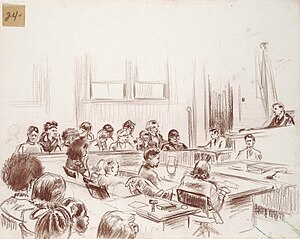
Back Pro hac vice Czech Pro hac vice German Pro hac vice Finnish Pro hac vice French Pro hac vice Croatian Pro hac vice Italian Pro hac vice Japanese Pro hac vice Dutch Pro hac vice Polish Pro hac vice Portuguese

In the legal field in the United States, pro hac vice (English: /proʊ hæk ˈviːtʃeɪ/)[1] is a practice in common law jurisdictions whereby a lawyer who has not been admitted to practice in a certain jurisdiction is allowed to participate in a particular case in that jurisdiction.[2] Although pro hac vice admission is available in every American jurisdiction,[3] civil law jurisdictions generally have much stricter rules for multi-jurisdictional practice.[4]
The term has a different meaning when used by the Catholic Church or under maritime law.
- ^ Black's Law Dictionary (8th Ed.)
- ^ Scott J. Goldstein, Constitutional Law: Attorney Not Entitled to Hearing upon Denial of Admission Pro Hac Vice, 44 Mo. L. Rev. 772, 773 (1979) (discussing common law origins of doctrine).
- ^ Legal Information Institute, Cornell University Law School (Accessed July 13, 2015) (discussing existence of pro hac vice statutes in all fifty states)
- ^ See, e.g., Ruggero J. Aldisert, Rambling Through Continental Legal Systems, 43 U. Pitt. L. Rev. 935, 945 (1982) (observing that in Germany, "simultaneous admission to the Amtsgericht (Justice of the Peace) and to the Landgericht (trial court of general jurisdiction) is permitted, but simultaneous admission to two Landgerichte is possible only in exceptional cases.")